

This article is reprinted from the WeChat official account:The first affiliated hospital of Fujian Medical University
Mr. Shi is a liver malignancy patient.
In December 2020, he underwent combined therapy including "surgical resection", "interventional embolization", "radiotherapy" and "targeted therapy" in the Department of Hepatic Surgery and Interventional Medicine at the First Affiliated Hospital of Fujian Medical University, effectively controlling the tumor.
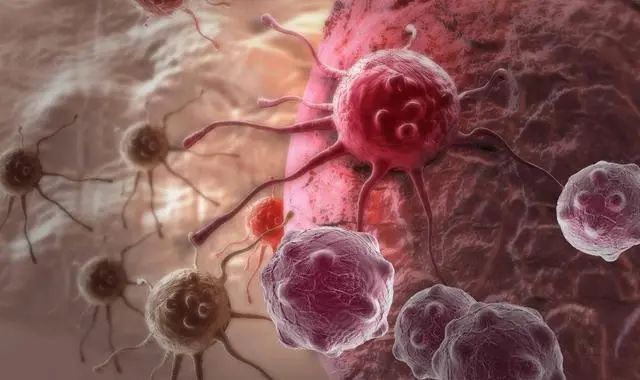
However, in a recent follow-up examination, doctors found that Mr. Shi's tumor had recurred, and despite trying various treatments, the effect was still not satisfactory. When feeling disappointed, Professor Lin Zhengyu, an oncology expert at the First Affiliated Hospital of Fujian Medical University, proposed a newly developed treatment - Nanoknife ablation therapy.
Recently, with the active assistance of Director Physician Zeng Kai and Nurse Manager Lin Lin from the Department of Anesthesiology, Professor Lin Zhengyu's team performed nano-knife ablation on Mr. Shi's recurrent liver cancer lesions.
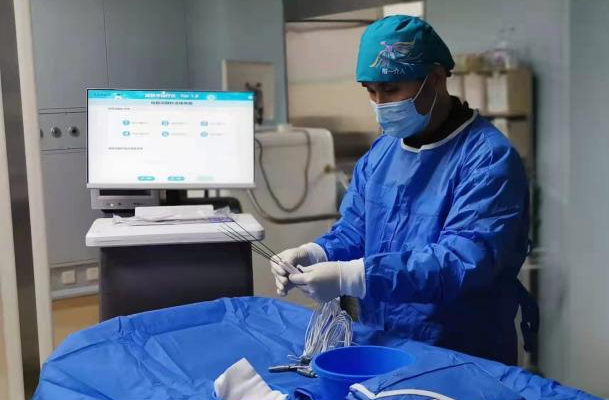

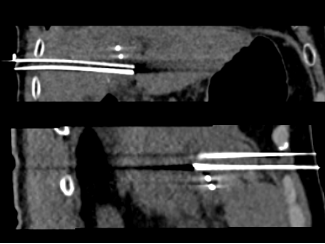
▲Precise puncture of tumor lesions under CT guidance.
"Mr. Shi's recurrent lesions were completely ablated after the ablation procedure, and the tumor has been effectively controlled," said Professor Lin Zhengyu.

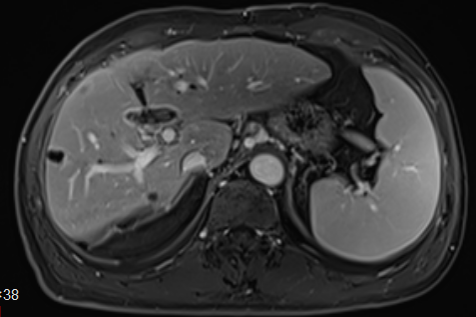
▲Postoperative MRI plain and enhanced scan shows that the lesion has completely disappeared, and no residual active lesions are seen on the enhanced scan.
What Is Nanoknife Ablation Technology?
Professor Lin Zhengyu introduced that NanoKnife is a new tumor ablation technology. It works by releasing high-pressure pulses to break the tumor cell membrane and form permanent nanoscale perforations on the tumor cells. This disrupts the balance within cancer cells, causing them to rapidly undergo apoptosis, also known as irreversible electroporation.
After the tumor cells undergo apoptosis, the phagocytes in the body will engulf the cell debris, and the treated area will gradually be replaced by normal tissue.
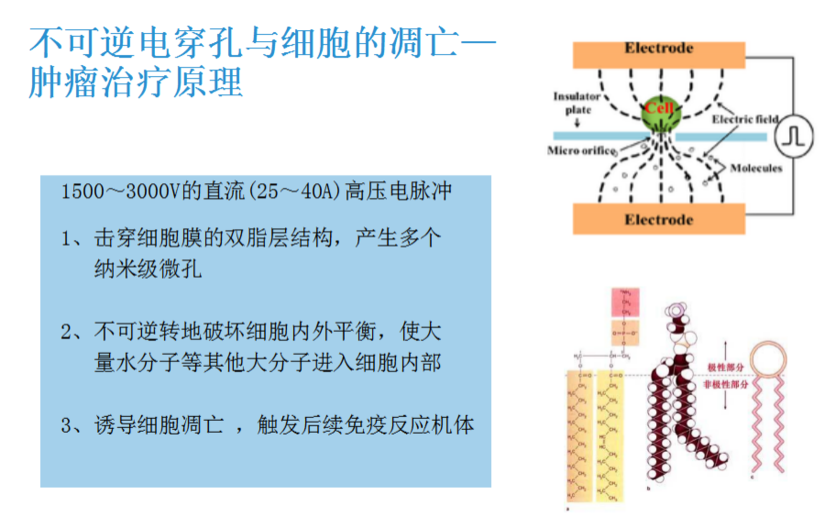
So far, more than 100 core tumor hospitals worldwide have adopted this technology, with over 6,000 cases treated. The tumors treated include pancreatic, liver, lung, kidney, prostate, and other solid organ and soft tissue tumors, particularly those located near major blood vessels, the porta hepatis, gallbladder, bile ducts, and ureters.
Tumor ablation is a major breakthrough in cancer treatment in the 21st century, which provides effective treatment and even cure opportunities for many patients who cannot undergo surgical resection or are not tolerant to surgery.
The commonly used techniques include thermal ablation (radiofrequency, microwave) and cryoablation (argon-helium knife and liquid nitrogen). NanoKnife is a special technique that is neither cold nor hot.
If "ablation" is the "crown" of local tumor treatment, then "NanoKnife" is the "pearl" on the crown.
纳米刀的优势
林征宇教授介绍,纳米刀具有其他消融技术所不具有的优点,包括——
● 对组织的消融具有选择性,只破坏“细胞”,不伤及血管壁、神经、气管和支气管、胆管、肠管、输尿管;
● 治疗彻底,消融区界限清楚;
● 消融不产生热量,也不依赖热量,不受临近的大血管(例如腹腔动脉、主动脉)血流所影响;
● 引起的细胞死亡不是“坏死”,而是凋亡,可激发抗肿瘤免疫反应;
● 治疗时间极短,治疗3厘米大小肿瘤只需5分钟,麻醉时间相应缩短,有利于术后康复;
● 效果过程可实时监控,可在超声、CT 或MR 上清楚地显示出来,从而保证消融达到最大效果。
纳米刀适应症
As one of the first national-level training bases for restricted medical technologies-tumor ablation, the First Affiliated Hospital of Fujian Medical University ranks among the top in China in terms of its ablative treatment level, particularly in being the first to carry out tumor thermal ablation therapy under MRI guidance. This not only fills the technological gap in China, but also develops multiple independently-owned devices, equipment and software, and achieves product transformation. Tumor patients can consult and receive treatment in the Interventional Department of the First Affiliated Hospital of Fujian Medical University.
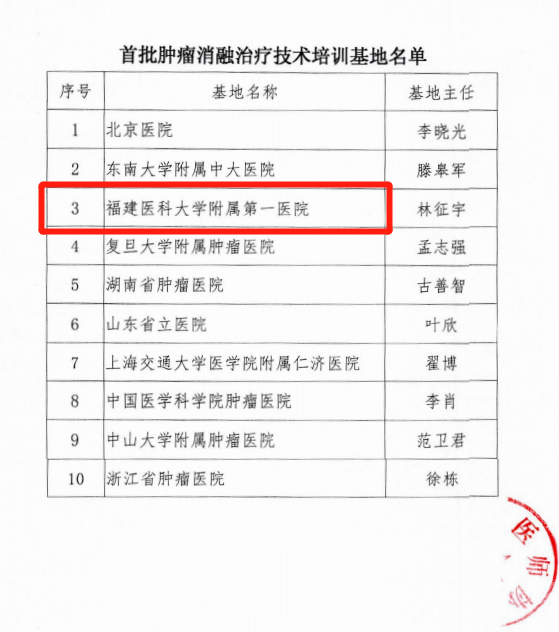
▲In 2019, the First Affiliated Hospital of Fujian Medical University became one of the first 10 training bases for tumor ablation therapy recognized by the Chinese Medical Association (the only one in Fujian province).
Comrade Lin Zhengyu serves as the director of the base and has completed training for multiple batches of students from all over the country.

|
Lin Zhengyu
Doctor of Medicine, Chief Physician, Associat e Professor,and Master's Supervisor. Director of Interventional Department of the First Affiliated Hospital of Fujian Medical University Professional Expertise: Minimally invasive intervention diagnosis and treatment of tumors under MRI/CT guidance. Specializes in MRI/CT-guided biopsy, drainage, intervertebral disc intervention, 125I radioactive particle implantation, tumor ablation, and other interventional treatments for various systems. He is one of the pioneers and leaders in MRI-guided interventional therapy in China, and his MRI-guided tumor radiofrequency and microwave ablation techniques have reached an advanced international level. Primary academic appointments: Deputy Leader of the Tumor Ablation Treatment Expert Group of the Chinese Medical Association, Deputy Director of the Tumor Ablation Treatment Expert Committee of the Chinese Society of Clinical Oncology (CSCO), Executive Committee Member and Secretary-General of the Tumor Ablation Treatment Professional Committee of the China Anti-Cancer Association, Member of the Interventional Physicians Branch of the Chinese Medical Association and Deputy Leader of the Tumor Ablation Study Group, Deputy Director of the Respiratory Disease Intervention Special Committee of the Interventional Learning Group of the Radiological Branch of the Chinese Medical Association, Deputy Director of the Ablation Branch of the Tumor Minimally Invasive Treatment Professional Committee of the China Anti-Cancer Association, Executive Committee Member of the Particle Branch of the Tumor Minimally Invasive Treatment Professional Committee of the China Anti-Cancer Association, and Deputy Director of the Interventional Radiology Physicians Branch of the Fujian Medical Association. Participated and presided over multiple national and provincial level projects, and published over 100 papers. Served as an editor for the Journal of Cancer Research and Therapeutics. |